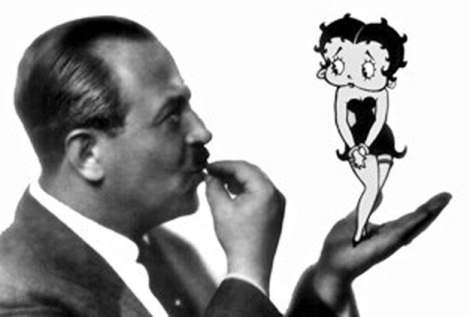Blog
Geplaatst op donderdag 04 april 2019 @ 19:40 door Marilyn_Presley , 2103 keer bekeken

Max Fleischer: The History And Unveiling Of The Cartoon Betty Boop Part II Of II
Fleischer created a number of firsts with his brother, including the “bouncing-ball” sing along cartoons, which were silent but synchronized to the cinema orchestras. His cartoon “Song Car-Tune” was the first cartoon with a soundtrack, and was produced in 1924. Betty Boop was the first female cartoon star, making her debut in 1930. She was the girlfiend of an unpopular character named Bimbo, who starred in Dizzy Dishes, and she soon had her own series. The Fleischer brothers’ creation was a sexy woman in the form of a cartoon character. Gary Morris recalled her appearance in Bright Lights Film Journal, “Betty is best remembered for her red-hot jazz baby persona. With a head like a giant peanut, vast mascara’d eyes, too-kissable lips, baby-doll voice (courtesty of singer Mae Questel), flattened marcelled hair, and mere threads of a dress exposing miles of hot flesh, she was the perfect celluloid sex toy.”
A far cry from the wholesome characters being created at the Disney Studios, Betty Boop not only appeared sexy but acted the part. She was often shown undressing and kissing clowns, cats, and other creatures. While other cartoons of the time were focusing on the charming lives of adorable animals, the Fleischers had Betty running around in her slinky costumes, living the life of a provocative young woman. The general trend in movies and cartoons was more respectable, and Betty Boop was bucking this trend. Amelia S. Holberg discussed the differences between Disney and the Fleischers in American Jewish History, “By the time Pinocchio was released, Disney had redefined animation as a children’s genre. The very adult Betty Boop, on the other hand, was a flapper, a flashy city party girl, not a respectable lady and definitely not an appropriate character for children’s films.” The Hays office Production Code was instituted in 1934, and censors transformed Betty Boop into an all-American girl, clothing her more fully and temporarily banning her garter. The series ended in 1939, but there was a Betty Boop revival in the 1970s. She starred in a touring film festival, “Betty Boop’s Scandals,” and was featured in Macy’s Thanksgiving Day Parade in 1984. 1985 saw Betty Boop’s network television debut, and her sixtieth birthday was celebrated in the animated special, “Betty Boop’s Hollywood Mystery.”
Plaats een reactie
Je moet ingelogd zijn om een reactie te mogen plaatsen. Klik hier om in te loggen.

Reacties
Er zijn nog geen reacties geplaatst.